- Home
- Edward Cline
SH05_Revolution Page 12
SH05_Revolution Read online
Page 12
Hugh grinned in astonishment. “Why, Jack, I have never before heard you counsel patience!”
* * *
A few days after Hugh had departed for New York, Thomas Reisdale reported to Jack over supper at Morland Hall that the Governor had returned the cases of the Courier’s type. “They are of no use to anyone here,” he remarked, “and I am reluctant to offer them to Mr. Royle at the Gazette. I shall query the printers in Maryland and Carolina.”
After a moment, Jack said, “I’ll buy them.”
Reisdale frowned in surprise. “What on earth for?”
Jack only smiled. “So that Mr. Barret may perhaps someday speak again, in future.”
That October, the cases of lead type were delivered to Morland Hall. Jack Frake stored them in the basement of the great house.
* * *
Chapter 8: The Justices
On the day that Hugh Kenrick journeyed to Hampton and found passage on the Skate, a sloop bound for New York with a cargo of tar, shingles, oats, and Jamaican rum, Thomas Reisdale sent a servant around to the five other justices of Queen Anne County with an invitation to Freehold the next evening to meet over supper and a Michaelmas roast goose. The county court was scheduled to sit two weeks before the General Court sat in Williamsburg, the same day the Stamp Act was to come into effect. He wished to discuss with his fellow magistrates whether or not to open the court. The court sat for a few days each month, when the number of cases on the docket, usually civil matters, justified it.
He also sent an invitation to Jack Frake. He wished to have that man there, for his presence among any group of men exerted an inexplicable persuasion on them. He was not certain what it was or how it worked. Jack Frake was somehow like a rock of certitude.
That very evening, he was surprised when a servant showed into his study John Proudlocks, who offered his employer’s thanks and regrets. Reisdale asked the Indian, to whom he gave occasional instructions in law, why his employer could not come.
Proudlocks looked courteously informal, and almost sorry that he had to answer the question. “Mr. Frake asked me to convey this answer to you, should you chance to ask that, sir: This is something you must do yourself, on your own.” With that, he nodded his head, took a step back, turned, and left.
Reisdale did not fully comprehend the meaning of that answer, until after the Michaelmas supper the following evening.
It was a happy, convivial gathering of justices at his table, and in the course of the feast they traded news about their harvests, staff problems, the Indian war in the west, and rumors and news about the unrest in the northern colonies. When the subject of Ralph Cullis’s trip in the Piedmont was disposed of, Reisdale steered the conversation to the purpose of the supper. “As you know, sirs, the Stamp Act does not affect criminal matters. Writs and other legal documents necessary to the hearing and prosecution of simple larceny and other petty felonies may be employed without the requisite stamps.”
“What a benevolent exception to our persecution,” remarked Jock Frazer, whose plantation neighbored Freehold. “We may judge our fellow slaveys without fear of feeling the sting of a whip.”
Reisdale’s other guests grumbled in agreement.
Reisdale continued. “For this reason, and because there are three men languishing in Sheriff Tippet’s jail” — they all knew about the sailor who was caught stealing pullets from Lucas Rittles’s yard, and the two shipwrights who had absconded with lumber from Henry Nault’s warehouse on the river front — “I propose that the court open to try these cases this month, and after November first.”
“That is an ironic distinction,” ventured Reece Vishonn, “considering that the Act itself can be construed as an instance of grand larceny.”
The men around the table, including Reisdale, laughed without humor.
“That is the opinion of many thoughtful friends of mine in Maryland,” said Ira Granby, whose plantation neighbored Vishonn’s Enderly. “Curiously enough, they, too, have called the Act one of legalized theft!”
Moses Corbin, the mayor of Caxton and also a justice, said, “My friends in Pennsylvania write me that many courts in all the colonies may close in protest of it, or never open. The question is furiously and often violently argued everywhere.”
“I’ll wager there will be much rejoicing among debtors should that come to pass,” said Granby.
Reisdale said, “Our court needn’t be closed to criminal cases, sirs. We may sit without risk of censure, penalty, or nullification.”
“That is not a protest,” opined Granby with scorn.
Ralph Cullis said, “Indeed, that would be sitting by leave of Parliament, or by its neglect or oversight.”
All the men at the table glanced at Cullis. That man noted the attention, and rushed to add, “I disagree with my son on many matters, sirs, and that is one of them.”
Reisdale commented, “Very good point, Mr. Cullis.” He smiled in gratitude. “I shall work your observation into my pamphlet.”
Reece Vishonn mused, “Boston is a rowdy, dissolute town, ruled by mobs, malcontents, and idle sailors. Not at all a civil place. We would not want to emulate that den of iniquity in any protest.”
“Quite true,” agreed Reisdale. “We want no drunken rioting or pillaging to occur here. The question, then, is this: In future, after November first, will we convene for civil cases, as well, and risk Crown action, if we proceed without stamps? Now, the citizens of our fair county are not so litigious as are those in other counties, so our docket is not overflowing. Still, we would want to see justice done and our docket kept spare.”
“If the stamps are not here to use, then we cannot do business,” said Cullis with a shrug. “Why, we must needs tender our resignations to the Governor in protest. I have heard that the justices of Westmoreland County are contemplating such an action.”
Granby shook his head vigorously. “If the stamps are not available, then we cannot but proceed with business, sirs, and let the Governor do what he may about it!”
“He may relieve us of our seats, sirs, but we will have made our point,” said Corbin.
Vishonn snorted and said, “Let us not resort to a caitiff’s ploy, sirs! We ought to sit regardless of the Crown’s pleasure or displeasure! Do we abandon our houses, because we have espied a scamp canvassing our property and planning his burglary?”
“If we sit,” said Reisdale, “we must inform the county of our intention, and the Governor, as well.” He paused. “We must behave as though no Stamp Act ever threatened us. Here, then, is another question: Are we all agreed that the Act comprises a violation of the Constitution?”
The company muttered agreement.
Jock Frazer said, “If we sit, sirs, we must be frank about it. Perform a zestful Highland fling for them all to notice, not some dainty minuet!” He sat forward and glanced at each of his companions. “We must say that we sit without stamps, now and forever, for we judge the Act null and void for Constitutional reasons!”
“Aye, aye!” agreed the company.
“Who would pen such a statement?” asked Cullis.
Everyone looked at Reisdale.
“Very well,” said the host with a modest smile. “It is agreed, then. We will sit the second week of October. I will compose a statement of our intent and purpose.” He paused to caution, “It will require all our signatures.”
“Of course,” chuckled Vishonn. “We would not protest as masked Italian revelers!” He pounded the table once with a fist. “No dominos or funny hats for us! Let us sign our names with fire and fortitude!”
Jock Frazer rose and proposed a round of toasts to celebrate their decision. He picked up his glass of sherry and bid his fellow justices to rise. “To liberty!” he said.
“To Queen Anne County!” said Granby.
“To Virginia!” said Vishonn.
“To our host and his even-keeled wisdom!” said Corbin.
After his guests left that evening, Thomas Reisdale reflected on the mean
ing of courage, and understood what Jack Frake had meant. He had expected his fellow justices to unanimously agree to wait until George Mercer and the stamps arrived. It fairly shocked him that they agreed to sit in defiance of the Act. He had expected to argue himself hoarse in an effort to persuade them to sit for any reason, and to be defeated in the effort. It amazed him that it had been so simple and almost effortless a persuasion. Obviously, he had underestimated the determination of his fellow justices.
And he had secretly harbored the hope that he would be defeated, in order to save himself the courage to act against what he knew was wrong. Now, he had a taste of courage, something he had never had reason to call upon in his whole career. While the servants cleared the supper room, he found himself moving to his study to sit and compose the announcement.
Two days later, he accompanied a servant in his sulky to the courthouse in Caxton and watched the man nail a notice to the door of that modest structure. It read:
“To the Honorable Governor and his Council of Virginia, in Williamsburg:
“We, the undersigned magistrates of Queen Anne County, wish to inform you of our intention to act in our said capacity, and, by loyalty to our judicial oaths, and in conformity with and in steadfast recognition of the intrinsical liberties guaranteed by our charter and engrossed in our excellent Constitution, to dispense justice and equity to the inhabitants of said county, whether or no stamps required by the late Act of Parliament are available after the first of November next; and, furthermore, we will in future refuse to permit said stamps to bestow redundant, pretended, and abrogated legitimacy and sanctity upon any findings and proceedings which the undersigned may effect in this venue.
“Thomas Reisdale. Reece Vishonn. Ira Granby. Ralph Cullis. Moses Corbin. Jock Frazer.”
Without fanfare, the attorney rode with his servant back to Freehold. Townsmen gathered at the courthouse door to read the notice. The notice caused them to talk, to speculate, to frown. A few of them turned and saw the sulky halfway down Queen Anne Street, and doffed their hats in salute.
John Proudlocks, in town to have some of Morland Hall’s horses reshod at the smithy, noticed the crowd in front of the courthouse. He rode over, dismounted, and read the notice. “Ah!” he said to himself. “The sachem is a Long Knife after all!”
* * *
It was the second letter from county magistrates received by Lieutenant-Governor Fauquier. The first was from Westmoreland County, in which the justices tendered their resignations rather than “become instrumental in the destruction of our country’s most essential rights and liberties.” The one from Queen Anne County seemed to the Governor to indulge in outright delinquency. “Madness!” he exclaimed, tossing the letter down on his desk. “Sheer, brazen, hare-brained, lop-sided madness!”
“It smacks of rebellion, your honor,” suggested the secretary who brought the letter to him. This man then reminded the Governor of the day’s schedule, which included meeting some members of the Council at Mrs. Vobe’s coffeehouse near the Capitol in one hour. “Will you walk, sir, or shall I order the carriage?”
By now Fauquier’s pale features were livid. He rewarded the secretary with a scowl. “I shall walk!” he shouted angrily. “What do you think I am? An invalid? A fop? A macaroni?”
The secretary, startled by this uncharacteristic outburst, withdrew meekly from the office.
At the coffeehouse, Fauquier showed the letters to Councilmen John Blair and Peter Randolph. Blair was president of the Council and Auditor-General, Randolph, Surveyor-General of the Middle District, and brother of the Attorney-General, Peyton. “Madness, sirs!” fumed Fauquier. “Utter madness! What are we to do?” He had requested a meeting with these men to discuss the Westmoreland County letter. Now there were two letters for them to judge.
The Councilmen read the letters in turn and clucked their tongues.
“Let them be,” advised Randolph. “The fever will subside, once the stamps have been made necessary to lawful adjudication.”
“Yes,” said Blair. “Once the people have accustomed themselves to their necessity, this reckless frivolity will cease. ’Tis but puffed-up nit-picking!”
“But they are challenging the constitutionality of the stamps, sirs!” protested Fauquier, “And Parliament’s right to legislate for the colonies!” He wagged a finger at the Councilmen. “I tell you, gentlemen, I have lived in London, and know the difference between cankerous, rummaging mobs and rebellion! An ignorant rabble provoked by rogues like that Wilkes fellow is one thing! But a revolt by educated lawyers and justices is quite another! It is unprecedented!” Fauquier paused to catch his breath, then picked up one of the letters and tossed it back down again. “I have the distinct impression that they are daring me to act, calling me out to blades on the Palace Green with their effrontery! Every one of them!”
Randolph sighed and shook his head. “Do nothing, your honor. Deny them satisfaction.”
Blair urged, “Yes, your honor. Do nothing. Take no notice of it. Wait to see how severe the fever is.”
The conversation died for a moment, as it will when such counsel is given.
Blair thoughtfully sipped his coffee and helped himself to some bread that lay cut on a plate. He said, “I find it curious that so light a tax upsets so many bodies, your honor. The Assembly here is every bit as, shall we say, onerous in taxation as is Parliament. To me, the grounds for such a fuss as the people are making are muddy and quite shallow.”
Randolph nodded in agreement. “My brother Peyton and I discussed this very question the other day, your honor. We concurred that if, by remote and absurd chance, the Act were rendered harmless, very likely attention could be turned to the Assembly itself. Why, we tax everything from carriage wheels to slaves to real property. We regulate taverns and ordinaries and the production and export of our tobacco, and charge the people for the imposition. I, too, am confounded by the distinction that is being trumpeted about! It is unfortunate that we cannot better instruct the people in the imperatives of state and empire. If we could — and it would necessitate another tax to accomplish the thing — we would see better behavior and reasonableness among the people.”
Blair said, “I have heard that Mr. Mercer and Mr. Grenville were hanged in effigy in Westmoreland by that rascal Richard Henry Lee, and that he plans a demonstrative parade of some kind in this very town, before the General Court!” He scoffed. “Now, what kind of behavior is that on the part of a responsible, educated man?”
“One must suppose that he is feeling snittish about not having been appointed this colony’s stamp distributor,” remarked Randolph with smug condemnation. “He has formed an organization called the ‘Sons of Liberty.’ One must wonder where he got that appellation from.”
“Very likely from that other rascal, Henry,” speculated Blair. “It is in his style.”
Randolph chuckled, “One may wonder, further, if his application for the office had been successful, then he might have formed an organization called the ‘Sons of Placemen.’”
The two Councilmen laughed, temporarily oblivious to the Governor, who sat listening to this exchange with widening eyes.
Blair squinted in thought again, and said with more gravity, “It is absolutely imperative that Parliamentary authority in this matter be upheld, acknowledged, and respected. If it is not, we should not rest easy that the Assembly’s authority is secure, simply because the people rally to its independence from what they claim is interference. If they succeed, the people may be inflamed by a sense of heady victory over so large a power, in having checked Parliament itself, and campaign to reconstitute the government here, as well, to remove what they may charge as burdensome and intrusive costs.”
Fauquier blinked in incomprehension at the revelation, because it was a point that would never have occurred to him. The violence of the notion caused him to study his Councilmen as they talked. Both men were stout, well fed, and comfortable in their state. In fact, he thought, there was not a man on th
e Council who was not similarly endowed, except, perhaps, Thomas Nelson. There were Mr. Robinson, the Speaker of the House, and Randolph’s brother, Peyton, the Attorney-General, and so many of the principal men in the House. All stout, fattened by time, power, and privileged profligacy.
Fauquier shifted in his chair and felt his own light frame, which was delicate and nearly fragile. The contrast caused him to blink again and shake his head in dismissal of the observation.
“Why, they could very well deny us the authority to tax or regulate them in any matter!” Blair was saying to Randolph. “Can you imagine any worse conundrum? In order to raise revenue for worthy projects and the security of the colony — not to mention our salaries and the costs of maintaining the machinery of our government — we would be compelled to ask them, hats in hand, like common beggars!”
Randolph frowned in puzzlement, then grinned. “I fear that your beverage has been doctored with some fantasizing herb, sir! Now you have flown out into the realm of comical farce! Pshaw! The day will never dawn when we would be required to ask for such a thing! That would be ascribing wisdom and foresight to common men, granting them the power to decide what was or was not a worthy end! It is a foul scenario you belabor, sir, and I will not entertain the prospect a moment more!”
“Banish the thought, sir, and forgive me for having spoken it!” replied Blair with mock humility. “My only excuse is that I have been perusing my stately library, and encountered a similar notion in some tract or other.” He stopped to wonder why he had called his library “stately,” then remembered the contemptuous oratory of Patrick Henry last May. He wondered why he should recall that particular phrase, and in turn deemed it contemptible and banished the thought from his mind.
Fauquier grimaced and spoke. The Councilmen glanced at him as though remembering he was present. The Governor glanced around furtively at the other patrons in the room. “Speak low when you trade such speculative ramblings, sirs!” he admonished them. He took a last sip of his coffee and rose from the table. Blair and Randolph rose as well. “I must return to my duties now. And if by chance I am beset by nightmares tonight, I shall have two of my Councilmen to blame!” He picked up his cane and made to leave.

 Revolution
Revolution SH05_Revolution
SH05_Revolution War
War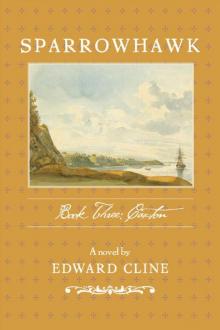 SH03_Sparrowhawk: Caxton
SH03_Sparrowhawk: Caxton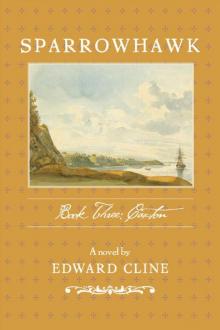 Sparrowhawk III
Sparrowhawk III Jack Frake
Jack Frake SH04_Empire
SH04_Empire Empire
Empire SH01_Jack Frake
SH01_Jack Frake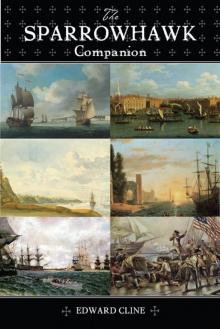 The Sparrowhawk Companion
The Sparrowhawk Companion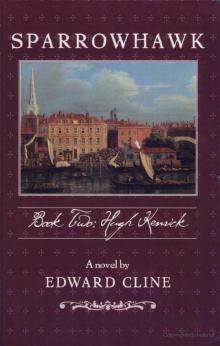 Hugh Kenrick
Hugh Kenrick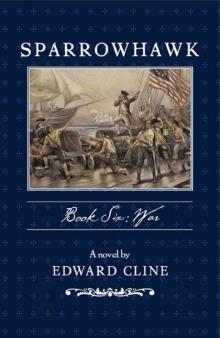 SH06_War
SH06_War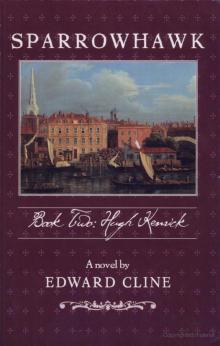 SH02_Hugh Kenrick
SH02_Hugh Kenrick